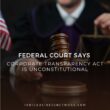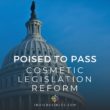Today, I listened to the live testimony given in support of and in opposition to the Colorado Safe Personal Care Products Act (HB 10-1248). I am told that an audio recording of the testimony will be made publicly available by the Colorado legislature and if so, I will post it when it becomes available. Although each side was given a total of only 40 minutes to testify, because the time for question and answer by the legislators was not counted, the hearing lasted from 3:30pm to 8:44PM EST, including a short summary by a sponsor of the bill, Rep. Dianne Primavera and a final vote, after which the bill failed by a 7 to 4 vote.
This post shares the major issues that were addressed by people on both sides of the matter in today's hearing. Please note that some of the testimony surrounded scientific issues on which I have little to no expertise. I listened carefully and took good notes, but I reserve the right to update this post to make any necessary corrections. Here are some of the people who testified for and against the bill.
Testifying against the bill were IBN member Cindy Jones of Sagescript Institute, the Personal Care Products Council (one of whose representatives was once the head of the FDA's Office of Cosmetics & Colors), Candidate Jerell Klaver, Elissa Klaver of Salus, a representative of Vitamin Cottage retail store chain, the Estee Lauder Companies, Procter & Gamble and Johnson & Johnson.
Testifying for the bill were Susan Roll, Vice Chair of the Women's Lobby of Colorado, Dr. David Norris (alongside Ms. Roll), Sarah Johnson of Serjj Organics, Rita Bellino of Queen B Spa, the Autism Society of Colorado and a registered neonatal care nurse. I know I am leaving out a few people, but those were the major players. These were the main points of discussion.
- Private Right of Action. One of the reasons the bill failed is because it creates a private right of action for Colorado consumers to bring suits against cosmetics manufacturers without presenting a basic cause of action for personal injury. Without getting too much into the legalities, in order to recover damages in general, a person must show there the defendant owed a duty to the plaintiff, that the defendant breached that duty, that an injury resulted and that the injury was caused by the breach of the duty owed by the defendant.
The bill as drafted would have opened the floodgate for opportunistic lawsuits which would have resulted in the imposition of penalties on any cosmetics company simply because a certain substance was found in a particular cosmetic, and no damages would have been required. There was some discussion about whether a statute allowing such an action is constitutional under Colorado law. While that question does not seem to have been answered to the satisfaction of everyone, it was clear that many of the lawmakers were troubled by the notion that substantial civil penalties could be imposed without any showing of injury.
One legislator (who is also an attorney, apparently in private practice) made the point that the law created a way for him to start pulling cosmetics off the shelf, doing his own testing and then suing the companies whose products tested for any of the substances prohibited by the law, and he wouldn't need a client or injury to do so.
- Trace Elements of Prohibited Substances. Many of the lawmakers were troubled by the fact that the most minute trace element of a prohibited substance triggered liability under the law. All of the scientists on both sides of the issue testified that the state of analytical chemistry today is such that a trace element of anything can be found in anything if sophisticated testing equipment is used to look for it.
This is supremely important because the bill did not contain a requirement that a minimum level of any substance was necessary in order to trigger liability under the law. Moreover, it was repeatedly admitted by the scientists on both sides that, even if you find a trace element of a specific substance, you cannot pinpoint that it came from any particular place.
As Dr. David Norris (testifying for the Women's Lobby of Colorado) put it, “The molecule is the molecule, and you can't differentiate its source just by looking at it.”
- The Precautionary Principle. The precautionary principle is apparently (and this is new to me so understand it is not scientifically or eloquently put) a principle that stands for the proposition that it is good public policy to put forth consumer protection laws as a precaution, even when the need for those laws has not been substantiated by reliable science.
This troubled lawmakers greatly, and for good reason. Everyone who testified, both for and against the bill, repeatedly stated that the science is simply not there to say that any substance used in cosmetics causes cancer or reproductive problems, even if that substance has been determined to be toxic somewhere in the world under some testing condition.
This point was driven home when Dr. Richard Adamson (testifying on behalf of the Personal Care Products Council), said that in order for lip sticks that contain trace elements of lead to be injurious to human health, one would have to eat (yes, literally eat) 3-4 tubes of it a day for 70 years before it could become potentially harmful.
Dr. Adamson also said of 1,4-dioxane (which can be used as a foaming agent in cosmetics), one of the substances that would have triggered the law, that one would have to take 700 baths a day for 70 years in order for the substance to become potentially harmful to a human being.
One obvious flaw in the science is that much of it is based on tests conducted on animals — tests that expose the animals to large amounts of the substances and often through oral ingestion, which of course does not happen with cosmetics.
- Looking to the European Union. Many lawmakers were troubled by the fact that the legislation would have allowed the European Union to determine that a substance was unsafe for use in cosmetics in the United States, and particularly in the state of Colorado. They asked many questions of Rep. Dianne Primavera, and finally got to the bottom at least of the intent of the bill which, according to Ms. Primavera, was to require that both the European Union and one of the agencies or “authorities” listed in the bill determine that a substance is toxic before it would be triggered in the law if passed. Without getting too granular on that point, one of the many obvious problems with that is that it would have put everyone in the position of having to spend monumental amounts of time checking to see which ingredients were listed where, and when.
It's not possible to run a state, much less a cosmetics business, that way and the lawmakers realized that.
Legislators were also bothered by the fact that the bill did not contain any oversight responsibility for any Colorado regulatory agency, such as the Department of Health. Many of them were also troubled, on principle alone, that Colorado would look to the European Union (where Colorado has no representatives) to give the thumbs up or not to an ingredient in a cosmetic used by consumers in their state.
- Why Cosmetics? Not a few of the lawmakers continually questioned why aim was being taken at cosmetics instead of at the food they had for lunch that day. Some of these comments were made tongue in cheek, but the scientists all agreed that there is simply no scientific way to show that, if someone contracts a disease, that they contracted it from bad food, bad air, bad water or anything else “bad.” Time and time again, the point was made that you simply cannot always explain devastating illnesses.
This Is Just The Beginning
This short summary only scratches the surface. Not only that, it is clear that enough of the problems that caused this bill to fail are fixable, so we know that a new version of the bill is likely to be introduced again.
There are also media reports, which I have not been able to confirm, that legislation similar to this is pending in several other states across the nation. This means that we must be vigilant and mobilized to remain on the forefront of this issue. It took a few dozen people working feverishly for a full week to mobilize around this issue once we discovered that a hearing would take place today.
If I'm not mistaken, we have IBN member Kelly Bloom of Southern Soapers to thank for sounding that alarm first, followed by IBN member Kayla Fioravanti of Essential Wholesale, followed by several other people who exchanged emails, blog posts and comments in the many hundreds to pull together this effort. Special thanks of course go to Jerell and Elissa Klaver of Salus who worked tirelessly to advocate in person before the hearing so the voice of small business would not come as a surprise.
Will You Volunteer In Your State?
To continue to tackle these issues at the federal level and in all fifty states, we will need people and yes, we will need money. I'm not sure how we will get the money yet, but if you are a member of IBN, you know we already have the people.
IBN has members in all fifty states and if you are a member, I highly encourage you to join our team of State Legislative Advocacy Leaders — you can meet them here at our social network. As you can see, we have Advocacy Leaders in California, Colorado, Maine, New Jersey, North Carolina, South Carolina, Ohio, Washington and Vermont. Nine states down, 41 more to go, plus the District of Columbia. Please consider joining us so that we have at least one representative (preferably two) in each state to sound the alarm if and when new legislation like this arises and if it is now pending.
We cannot do this alone, but together, we can duplicate what happened in Colorado fifty times so that we can continue to deliver safe personal care products to our customers without being driven out of business by unnecessarily burdensome laws that are based on faulty science and do nothing more than drive us out of business for no reason.
Please join us at our FaceBook Page!
Question: If you are a member of IBN, will you join the other volunteers? Please leave any comments or questions you have, and any volunteering, below.



